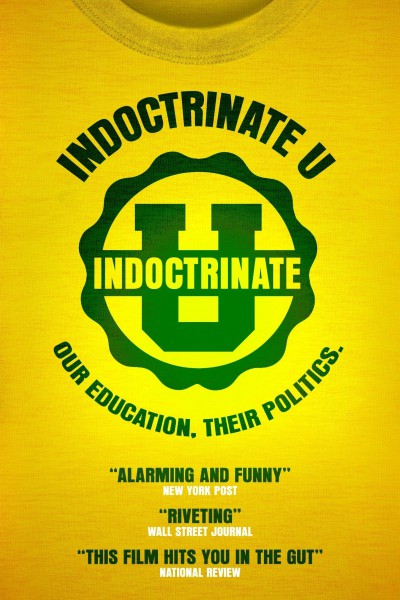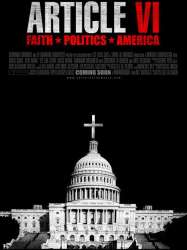Indoctrinate U est un film américain de genre Documentaire réalisé par Evan Coyne Maloney avec Evan Coyne Maloney
Indoctrinate U (2007)

Si vous aimez ce film, faites-le savoir !
Durée 2h
Réalisé par Evan Coyne Maloney
OrigineEtats-Unis
Genres Documentaire
Themes Le thème de l'éducation, Documentaire historique, Documentaire sur la politique, Politique, Langues et la traduction
Note69%










Indoctrinate U is a 2007 American feature-length documentary film written by, directed by and starring Evan Coyne Maloney, that examines controversial topics like equality and fairness, diversity, ideological conformism and political correctness in American institutions of higher education. To great extent, the film uses for comedic effect the irony of subjective and selective suppression of free speech and of thought in universities, from the harassment by administrators of professors who hold minority views, to institutional mechanisms such as speech codes, which are used to punish students who express political views that are unpopular within academia.
Acteurs

Evan Coyne Maloney
(Lui-même)
Commentaires
Postez un commentaire :
Suggestions de films similaires à Indoctrinate U
Il y a 0 films ayant les mêmes acteurs, 0 films avec le même réalisateur, 8961 ayant les mêmes genres cinématographiques, 9112 films qui ont les mêmes thèmes (dont 0 films qui ont les mêmes 5 thèmes que Indoctrinate U), pour avoir au final 70 suggestions de films similaires.Si vous avez aimé Indoctrinate U, vous aimerez sûrement les films similaires suivants :

Being Osama (2004)
Réalisé par Mahmoud Kaabour
Origine Canada
Genres Documentaire
Thèmes Les attentats du 11 septembre 2001, Le racisme, Religion, Le terrorisme, Transport, Aviation, Documentaire sur la discrimination, Documentaire sur le droit, Documentaire sur la guerre, Documentaire historique, Documentaire sur une personnalité, Documentaire sur la politique, Documentaire sur la religion, Documentaire sur les technologies, Documentaire sur le terrorisme, Documentaire sur les villes, Politique, Religion musulmane, Film catastrophe, Film de catastrophe aérienne, Langues et la traduction, Détournement d'avion
Note70%





The documentary details the lives of six Montreal Arab men, all with the first name "Osama":

A City Decides (1956)
, 27minutesRéalisé par Charles Guggenheim
Origine Etats-Unis
Genres Documentaire
Thèmes Le thème de l'éducation, Le racisme, Documentaire sur la discrimination, Documentaire sur le droit, Documentaire historique, Documentaire sur une personnalité, Documentaire sur la politique, Politique
Note64%






The Texas Promise (2015)
, 1h39Origine Etats-Unis
Genres Documentaire
Thèmes Le thème de l'éducation, Documentaire historique, Documentaire sur la politique, Politique
When Texas cut $5.4 billion from public schools, it affected 5 million students and made Texas 49th in the country in per pupil spending. The Texas Promise follows the debate over the direction of Texas public education and its impact on the nation. With a lawsuit brought against the state by a collection of school districts claiming that the cutting of over 5 billion dollars from public education was unconstitutional, and a variety of contested bills up for passage in the 83rd Legislature, the film explores what is at stake for students in the Texas school system and what the policy decisions might mean for the future of Texas.

Estudiar en primavera (2014)
, 53minutesGenres Documentaire
Thèmes Le thème de l'éducation, Documentaire sur le droit, Documentaire historique, Documentaire sur une personnalité, Documentaire sur la politique, Politique
Note83%






Precious Knowledge (2010)
Origine Etats-Unis
Genres Documentaire
Thèmes Le thème de l'éducation, Documentaire historique, Documentaire sur la politique, Politique
Note78%





 , 1h37
, 1h37Origine Etats-Unis
Genres Documentaire
Thèmes Le thème de l'éducation, Documentaire historique, Documentaire sur la politique, Politique
Acteurs Ben Stein
Note37%






Rubber Room (2012)
, 1h18Origine Etats-Unis
Genres Documentaire
Thèmes Le thème de l'éducation, Documentaire historique, Documentaire sur la politique, Politique
Note74%






The Revisionaries (2012)
, 1h32Origine Etats-Unis
Genres Documentaire
Thèmes Le thème de l'éducation, Documentaire historique, Documentaire sur la politique, Politique
Note69%






Waiting for Superman (2010)
, 1h42Réalisé par Davis Guggenheim
Origine Etats-Unis
Genres Documentaire
Thèmes Le thème de l'éducation, L'enfance, Documentaire historique, Documentaire sur une personnalité, Documentaire sur la politique, Politique
Acteurs George Reeves
Note73%





Documentaire sur l'état catastrophique du système éducatif américain.Davis Guggenheim part à la rencontre des élèves et de leurs parents, mais aussi des professeurs et membres de ce système qui essayent, jour après jour, de l'améliorer.

Article VI (2008)
, 1h30Origine Etats-Unis
Genres Documentaire
Thèmes Religion, Documentaire historique, Documentaire sur la politique, Documentaire sur la religion, Politique
The story follows filmmaker Bryan Hall's experience as a Mormon during the 2008 Presidential race. While following the debates, Hall becomes increasingly aware of the escalating attacks against a particular candidate over his religion: Mitt Romney, who happens to also be a Mormon. Hall decides to investigate this issue and comes to realize that the issue of religious bigotry in politics goes far beyond his own faith. It has been the subject of intense argument from the earliest days of the American colonies. In the end, Hall makes the case for the need for religious tolerance in America; not just for his religion, but for all religions.
 Connexion
Connexion